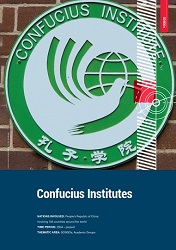EXECUTIVE SUMMARY. CONFUCIUS INSTITUTES
EXECUTIVE SUMMARY. CONFUCIUS INSTITUTES
Author(s): Author Not Specified
Subject(s): Governance, International relations/trade, Higher Education , State/Government and Education, Social development, Sociology of Education
Published by: NATO Strategic Communications Centre of Excellence
Keywords: Confucius Institutes; educational institution; Chinese government; Chinese language and culture; intellectual freedom;
Summary/Abstract: The Confucius Institutes (CIs) are non-profit educational institutions funded by the Chinese government, with the stated purpose of promoting Chinese language and culture. Since the launch of the Confucius Institutes programme in 2004, the large-scale initiative has been described as a Chinese “soft power” success. The Confucius Institutes have secured a number of partnerships with universities in 146 countries around the world, including in NATO member states. In 2017, there were 525 Confucius Institutes at colleges and universities, as well as 1,113 Confucius classrooms at primary and secondary schools. The CI initiative takes on a number of measures that differentiate it from other cultural institutions, particularly in the way the CIs become a structural unit of a host university and employ a double directorship system. However, the motives behind this large-scale initiative and the procedures of installation in host countries have attracted criticism, in particular the lack of transparency concerning the university contracts, hiring policies and financial aspects. Moreover, reports of self-censorship on sensitive political and historical topics (such as Tibet, Taiwan, or the Tiananmen Square protests of 1989) by both Chinese teachers and local university professors have raised concerns about intellectual freedom. Several scandals in 2014 involving instances on censorship cast light on the hard-line approach applied by the previous Director General, and the tight control exerted by the CI’s governing body Hanban and the Chinese Ministry of Education. The controversy resulted in the non-renewal of CI contracts in several universities in the US and Europe and greatly contributed to the perception of CIs as an instrument of Chinese influence.
- Page Count: 18
- Publication Year: 2019
- Language: English
- Content File-PDF
- Introduction

